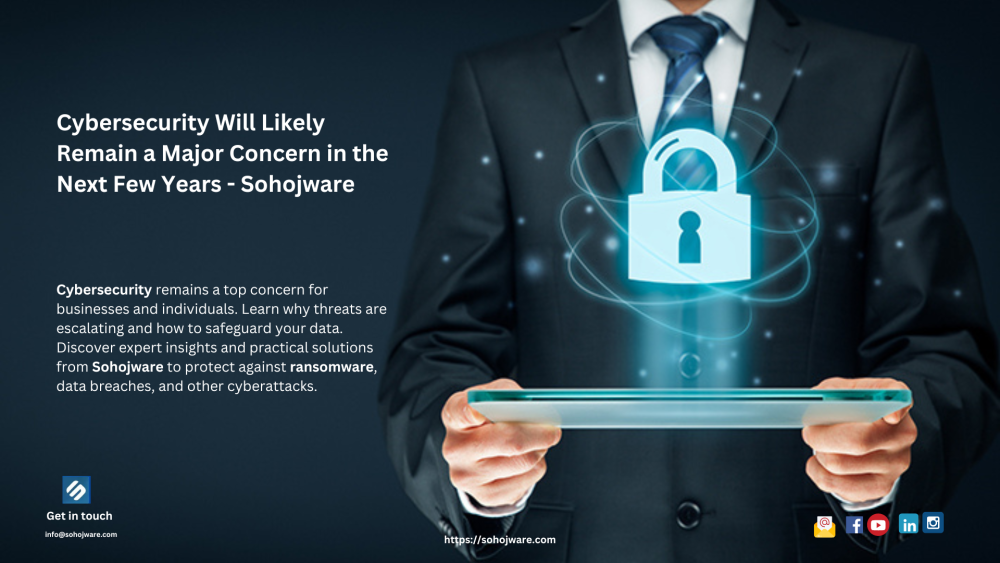The digital age has brought incredible advancements, revolutionizing how we connect, conduct business, and access information. However, this interconnected world has also opened doors for malicious actors, making cybersecurity a paramount concern for individuals, businesses, and organizations of all sizes. As technology evolves at an unprecedented pace, experts predict that cybersecurity threats will only become more sophisticated and widespread in the coming years.
At Sohojware, a leading IT service provider based in Bangladesh, we understand the critical importance of cybersecurity. We offer a comprehensive suite of cybersecurity solutions designed to protect your valuable data and assets from ever-evolving threats.
In this article, we'll delve into the reasons why cybersecurity will likely remain a major concern in the next few years, explore the evolving threat landscape, and highlight the importance of implementing robust cybersecurity measures.
Why Cybersecurity Will Remain a Top Priority
Several key factors contribute to the ever-increasing significance of cybersecurity:
-
The Expanding Attack Surface: As more devices and systems become connected to the internet (Internet of Things - IoT), the attack surface for cybercriminals significantly expands. This interconnectedness creates more potential entry points for attackers to exploit vulnerabilities and gain unauthorized access to sensitive data.
-
The Rise of Ransomware: Ransomware attacks have become a prevalent threat, with cybercriminals encrypting a victim's data and demanding a ransom payment for decryption. These attacks can be devastating for businesses, causing significant financial losses and operational disruptions.
-
The Evolving Threat Landscape: Cybercriminals are constantly developing new and more sophisticated attack methods. Traditional security measures may not be sufficient to defend against these evolving threats.
-
The Increasing Value of Data: In today's digital world, data is an invaluable asset. Personal information, financial records, and intellectual property are all targets for cybercriminals who can exploit this data for financial gain or other malicious purposes.
-
The Globalized Threat: Cybercrime is a global phenomenon, with attackers operating from anywhere in the world. This makes it challenging for organizations to defend themselves, as they need to be prepared for threats originating from any location.
The Evolving Threat Landscape: New Challenges for Cybersecurity
The cybersecurity landscape is constantly changing, with new threats emerging all the time. Some of the key challenges that organizations will need to address in the coming years include:
-
Supply Chain Attacks: Cybercriminals are increasingly targeting third-party vendors and suppliers in their attacks. By compromising a less secure vendor, attackers can gain access to a larger organization's network.
-
Cloud Security Risks: As more businesses move their data and applications to the cloud, cloud security becomes a critical concern. Organizations need to ensure that their cloud providers have robust security measures in place.
-
Social Engineering Attacks: Social engineering attacks exploit human psychology to trick victims into revealing sensitive information or clicking on malicious links. These attacks can be very effective, as they target the weakest link in the security chain - the human element.
-
Artificial Intelligence (AI) Powered Attacks: As AI technology advances, cybercriminals are increasingly using AI to automate their attacks and make them more difficult to detect.
-
The Proliferation of IoT Devices: The growing number of IoT devices connected to the internet creates a vast attack surface for cybercriminals. These devices often have weak security measures, making them easy targets.
The Importance of Proactive Cybersecurity Measures
Given the ever-evolving threat landscape, organizations must adopt a proactive approach to cybersecurity. This means implementing a layered security strategy that includes:
-
Regular Security Assessments: Conduct regular vulnerability assessments and penetration testing to identify and address weaknesses in your security posture.
-
Employee Training: Train your employees on how to identify and avoid cyber threats. This includes teaching them about phishing scams, social engineering attacks, and password security best practices.
-
Multi-Factor Authentication (MFA): Implement MFA to add an extra layer of security to your login process. MFA requires users to provide a second factor, such as a code from a mobile app, in addition to their username and password.
-
Strong Password Policies: Enforce strong password policies that require users to create complex passwords and change them regularly.
-
Data Encryption: Encrypt your sensitive data at rest and in transit to protect it from unauthorized access.
-
Regular Software Updates: Keep your software applications and operating systems up to date with the latest security patches.
-
Sohojware's Cybersecurity Solutions: Partner with a trusted IT security provider like Sohojware to develop and implement a comprehensive cybersecurity strategy tailored to your specific needs. We offer a wide range of security solutions, including managed security services, security awareness training, incident response planning, and threat intelligence.
By investing in robust cybersecurity measures and staying informed about the latest threats, organizations can significantly reduce their risk of falling victim to cyberattacks. Sohojware is committed to helping businesses protect their valuable assets through our comprehensive cybersecurity solutions and expertise.
FAQs
-
What are the most common cybersecurity threats facing businesses today?
The most common cybersecurity threats facing businesses today include ransomware, phishing attacks, data breaches, and supply chain attacks. These threats can have a devastating impact on an organization's operations, reputation, and bottom line. Sohojware offers a range of solutions to help protect your business from these threats.
-
How can I protect my business from ransomware attacks?
To protect your business from ransomware attacks, it's essential to implement a layered security approach that includes regular backups, employee training, and strong access controls. Additionally, using reputable antivirus and anti-malware software can help prevent ransomware infections. Sohojware can help you develop a comprehensive ransomware protection strategy.
-
What is the role of employee training in cybersecurity?
Employee training is a critical component of any effective cybersecurity program. By educating employees about cybersecurity best practices, you can significantly reduce the risk of human error, which is often the cause of data breaches. Sohojware offers comprehensive cybersecurity awareness training programs to help your employees stay informed and vigilant.
-
How can Sohojware help my business improve its cybersecurity posture?
Sohojware offers a wide range of cybersecurity services to help businesses of all sizes improve their security posture. Our services include risk assessments, vulnerability scanning, penetration testing, incident response planning, and managed security services. We can help you identify and address your specific security needs and develop a tailored cybersecurity strategy.
-
What is the cost of a data breach?
The cost of a data breach can be significant, including financial losses, legal fees, and reputational damage. In addition, the cost of recovering from a data breach can be time-consuming and disruptive to business operations. Sohojware can help you assess your risk and develop a cost-effective cybersecurity plan to protect your business.
By prioritizing cybersecurity and working with a trusted partner like Sohojware, organizations can build a strong defense against the ever-evolving threat landscape.




